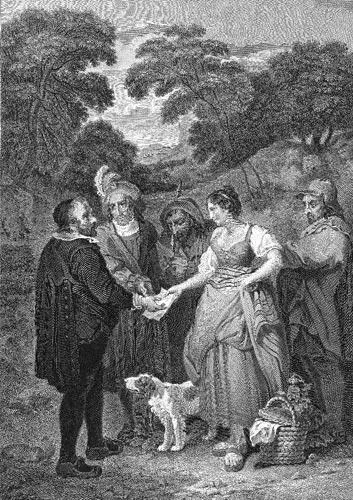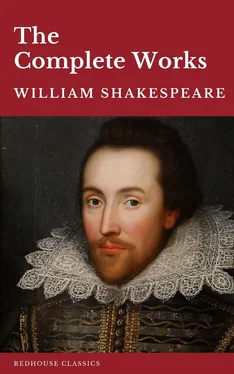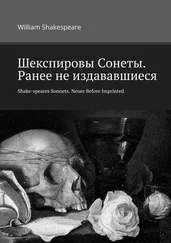[Hol.] Of piercing a hogshead! a good lustre of conceit in a turf of earth; fire enough for a flint, pearl enough for a swine: ’tis pretty; it is well.
Jaq. Good Master Person, be so good as read me this letter. It was given me by Costard, and sent me from Don Armado. I beseech you read it.
[Hol.] Facile, precor gelida quando [pecus omne] sub umbra ruminat, and so forth. Ah, good old Mantuan! I may speak of thee as the traveller doth of Venice:
[Venechia, Venechia],
Che non te [vede], che non te [prechia].
Old Mantuan, old Mantuan! who understandeth thee not, loves thee not. Ut, re, sol, la, mi, fa. Under pardon, sir, what are the contents? or rather, as Horace says in his—What, my soul, verses?
[Nath.] Ay, sir, and very learned.
[Hol.] Let me hear a staff, a stanze, a verse; lege, domine.
[Nath.] [Reads.]
“If love make me forsworn, how shall I swear to love?
Ah, never faith could hold, if not to beauty vowed!
Though to myself forsworn, to thee I’ll faithful prove;
Those thoughts to me were oaks, to thee like osiers bowed.
Study his bias leaves, and makes his book thine eyes,
Where all those pleasures live that art would comprehend.
If knowledge be the mark, to know thee shall suffice;
Well learned is that tongue that well can thee commend,
All ignorant that soul that sees thee without wonder;
Which is to me some praise that I thy parts admire.
Thy eye Jove’s lightning bears, thy voice his dreadful thunder,
Which, not to anger bent, is music and sweet fire.
Celestial as thou art, O, pardon love this wrong,
That sings heaven’s praise with such an earthly tongue.”
Hol. You find not the apostraphas, and so miss the accent. Let me supervise the [canzonet]. [He takes the letter.] Here are only numbers ratified, but for the elegancy, facility, and golden cadence of poesy, caret. Ovidius Naso was the man. And why indeed ‘Naso,’ but for smelling out the odoriferous flowers of fancy, the jerks of invention? Imitari is nothing: so doth the hound his master, the ape his keeper, the tired horse his rider. But, damosella virgin, was this directed to you?
Jaq. Ay, sir, from one Monsieur Berowne, one of the strange queen’s lords.
[Hol.] I will overglance the superscript: “To the snow-white hand of the most beauteous Lady Rosaline.” I will look again on the intellect of the letter, for the nomination of the party [writing] to the person written unto: “Your ladyship’s in all desired employment, Berowne.” Sir [Nathaniel], this Berowne is one of the votaries with the King, and here he hath framed a letter to a sequent of the stranger queen’s, which accidentally, or by the way of progression, hath miscarried. Trip and go, my sweet, deliver this paper into the royal hand of the King; it may concern much. Stay not thy compliment; I forgive thy duty. Adieu.
Jaq. Good Costard, go with me. Sir, God save your life!
Cost. Have with thee, my girl.
Exit [with Jaquenetta].
[Nath.] Sir, you have done this in the fear of God, very religiously; and as a certain father saith—
Hol. Sir, tell not me of the father, I do fear colorable colors. But to return to the verses: did they please you, Sir Nathaniel?
Nath. Marvellous well for the pen.
Hol. I do dine to-day at the father’s of a certain pupil of mine, where, if (before repast) it shall please you to gratify the table with a grace, I will, on my privilege I have with the parents of the foresaid child or pupil, undertake your bien venuto; where I will prove those verses to be very unlearned, neither savoring of poetry, wit, nor invention. I beseech your society.
Nath. And thank you too; for society, saith the text, is the happiness of life.
Hol. And certes the text most infallibly concludes it. [To Dull.] Sir, I do invite you too, you shall not say me nay: pauca verba. Away, the gentles are at their game, and we will to our recreation.
Exeunt.
¶
 Francis Wheatley , p. — James Neagle , e.
Francis Wheatley , p. — James Neagle , e.
Enter Berowne with a paper in his hand, alone.
Ber. The King he is hunting the deer: I am coursing myself. They have pitch’d a toil: I am toiling in a pitch—pitch that defiles—defile! a foul word. Well, “set thee down, sorrow!” for so they say the fool said, and so say I, and I the fool: well prov’d, wit! By the Lord, this love is as mad as Ajax. It kills sheep; it kills me, I a sheep: well prov’d again a’ my side! I will not love; if I do, hang me; i’ faith, I will not. O but her eye—by this light, but for her eye, I would not love her; yes, for her two eyes. Well, I do nothing in the world but lie, and lie in my throat. By heaven, I do love, and it hath taught me to rhyme and to be mallicholy; and here is part of my rhyme, and here my mallicholy. Well, she hath one a’ my sonnets already: the clown bore it, the fool sent it, and the lady hath it: sweet clown, sweeter fool, sweetest lady! By the world, I would not care a pin, if the other three were in. Here comes one with a paper, God give him grace to groan!
He stands aside, [climbing into a tree].
The King ent’reth [with a paper].
King. Ay me!
Ber. [Aside.] Shot, by heaven! Proceed, sweet Cupid, thou hast thump’d him with thy bird-bolt under the left pap. In faith, secrets!
King [Reads.]
“So sweet a kiss the golden sun gives not
To those fresh morning drops upon the rose,
As thy eye-beams, when their fresh rays have smote
The night of dew that on my cheeks down flows;
Nor shines the silver moon one half so bright
Through the transparent bosom of the deep,
As doth thy face through tears of mine give light.
Thou shin’st in every tear that I do weep,
No drop but as a coach doth carry thee;
So ridest thou triumphing in my woe.
Do but behold the tears that swell in me,
And they thy glory through my grief will show.
But do not love thyself, then thou [wilt] keep
My tears for glasses, and still make me weep.
O queen of queens, how far dost thou excel
No thought can think, nor tongue of mortal tell.”
How shall she know my griefs? I’ll drop the paper.
Sweet leaves, shade folly. Who is he comes here?
Enter Longaville [with a paper]. The King steps aside.
What, Longaville, and reading! Listen, ear.
Ber. [Aside.]
Now in thy likeness, one more fool appear!
Long.
Ay me, I am forsworn!
Ber. [Aside.]
Why, he comes in like a perjure, wearing papers.
[King] [Aside.]
In love, I hope—sweet fellowship in shame.
Ber. [Aside.]
One drunkard loves another of the name.
Long.
Am I the first that have been perjur’d so?
Ber. [Aside.]
I could put thee in comfort: not by two that I know.
Thou makest the triumphery, the corner-cap of society,
The shape of love’s Tyburn that hangs up simplicity.
Long.
I fear these stubborn lines lack power to move.
O sweet Maria, empress of my love,
These numbers will I tear, and write in prose!
Ber. [Aside.]
O, rhymes are guards on wanton Cupid’s hose:
Читать дальше

 Francis Wheatley , p. — James Neagle , e.
Francis Wheatley , p. — James Neagle , e.










